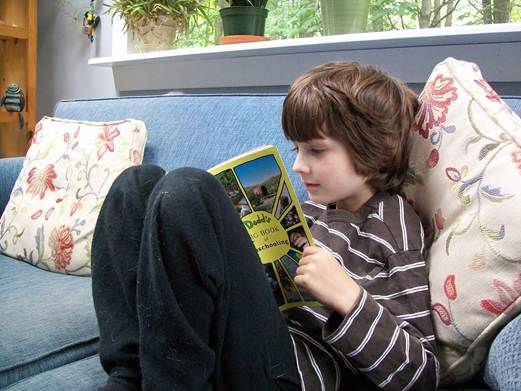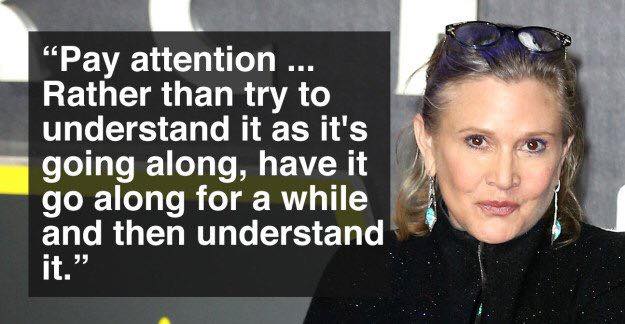
Ler um pouco, experimentar um pouco, esperar um pouco, observar.
Lees een beetje, probeer een beetje, wacht een tijdje, kijk.
Read a little, try a little, wait a while, watch.
|
"Your perspective will change when you've experienced new things, seen the world from a different place." —Debbie Regan |
 |
Sandra Dodd
June 12, 2010
Last Saturday I was in Montreal and said this:
"Read a little, try a little, wait a while, watch."
I said it several times. I think it might be a good new intro to my website. Reading does nothing without action. Action does nothing without patience and observation. When you know a little, more of the readings will make sense. (When you know more and more, the readings will make more sense.) (original, with some comments)
Notes and quotes from online discussions:
Read a little...
If you read too much, it will be a waste of energy. School-style reading is worthless here. It "doesn't count" for you to run your eyes over the words as fast as you can.
...try a little...
If you read a little, and try those ideas out, and see if they help, that will do you more good than telling us you're frustrated. Any change can be frustrating. We're trying to show you the paths we've been on or seen others follow. It's worth noting which trails are time-wasting detours, or lead to dangerous cliffs."If you wait to do unschooling *after* you understand it, it's unlikely you'll ever understand it. Learning itself works through experience. Unschooling is the same way. It's largely grasped by experiencing it."
—Katherine Anderson, April 2014
...wait a while...
Agitation makes one's heart beat quickly and time seems to go faster. Learning to calm down is an asset. Breathe.Joyce Fetteroll wrote in February 2014:
"A big part of natural learning is absorbing ideas and letting them swirl around in the background. They clarify. They form connections. If the subject comes up again in a few months, you may be surprised how differently you're looking at what you were wondering about."
...watch.
Watch what?Karen James wrote this in September, 2013:
The best thing I did for my relationship with my son, which, consequently, added to his ease of learning naturally, was to look away from what all of my friends were doing, and look more closely at what my own son was inspired by.
Every time I found myself comparing what we were doing with what others were doing, I actively choose to look more closely at us. I would think about ways I could enhance my son's experiences. Sometimes that meant I needed to step back a bit, and give him more room to really dive in to what he was interested in. Sometimes that meant introducing some new item or place or person or experience to our days. Sometimes it was a combination of both.
What I learned was that my son is really exactly where he needs to be to learn the things he needs to learn to be the person he is today and will become tomorrow. I don't need to force anything. I don't need to improve anything. What I need to do is support him in his learning and use my years of experience to make his world the most optimal sandbox from which he can learn from.
—Karen James
**
try a little (don't keep asking—change your actions and reactions)
wait a while (too much writing and too much reading keeps you from being with your child)
watch (observe your child; observe your reactions and thoughts)
It can help not to try so hard to take it all on as a big new idea, but to gradually incorporate aspects of it into your life. Look for aspects that make sense to you now. Start to make one or two changes that do make sense to you.
It might be, for example, to be more present with each of your children when you are with them. To engage with them on their terms more. For some people, that may be a bit challenging to do in practice, but people here can help with practical ideas if you're having trouble.
Or perhaps saying yes more makes good sense to you. You may not really understand how it would change anything significantly or lead to understanding unschooling better, but focussing on being a kinder, more positive parent is a good step you could focus on for now.
Starting somewhere that does make sense to you will help you to grow and learn and change perspective, in a way that trying to get all the various ideas in your head to come to some agreement, won't.
Your perspective will change when you've experienced new things, seen the world from a different place.
[W]e have long experience with people new to unschooling, and we know that it is very important to take time to process the new ideas.Please take time for reflection. Take time for your mind to be calm and quiet. Take time to be open to input, not busy creating output. Don't respond, think. Take the ideas and let them "be" in your mind and go spend lots of time with your children and consider and observe how the ideas might play out in your own home with your own kids.
—Pam Sorooshian
quoted, more, here
"Read a little, try a little, wait a while, watch" came about for a presentation Holly and I did in Quebec when she was staying with Bea Mantovani's family there for a few months and I went to visit. I wanted to have something new and different for that day, for them to hear something I hadn't said before. That was in 2010. We could've used having it sooner, but it hadn't been written sooner. 🙂
Sometimes people "discover unschooling" (discover their ability to read about it online) and totally neglect their kids for weeks, while they read more than they can absorb. Or worse, they look up from their reading and say "No more rules! Stay up as late as you want and eat anything you want!" and they go back to reading and ignoring the kids. That is Not Good. :-) The parents spin up a confused fantasy world about something they're not actually DOING or even learning to do.
It's kind of schoolish, the idea that the more one reads the more one knows. Unschooling is one of those things that isn't accomplished by recitation or test-taking, but only by changing thoughts and actions, beliefs and relationships. It's not easy, it's not quick, and it's not for everyone.
Sandra
This was me a year ago. I'm so grateful that came at a time when my youngest was young enough to be worn or nursing while I did this, and my oldest was very loud about his unhappiness. If he had been quieter about it, I don't know that he would have woken me up. I might have just kept reading right on past him. SO GLAD to have woken up.I remember once reading over the phrase, "Stop right now, leave the computer, and go spend time with your kids" (or something to that effect). And I hesitated, then kept right on reading, and felt guilty about it. I hadn't figured out yet, then, that
a.) I was reading so much so fast because I was unhappy, and guilty, and felt like I'd found the magical answers
b.) it's hard to learn when you're unhappy and stressed, which I was and
c.) the reading was less important than my very real, unhappy, lonely, stressed child. In some ways, reading this stuff IS magical. These ARE magical answers. But the magic happens as you learn how to connect with your child—and you can only do that by, well, doing it! The reading is supplemental, to help you learn how to connect with them—it can't replace your relationships.Now I know I can walk away from half-finished emails or facebook comments and come back later because being with my kids is more important—WAY more important than anything I'll ever find on a computer, or anything I could ever read or write. I can't DO this without them!!!!!!
It's also led to me being more thoughtful and careful about what I write, because I'm walking away a lot and rereading and rethinking a lot—it's like a dance, to me, like, I dance with them, I connect, I learn, I read here, I connect, I learn, I write a little, I dance with them some more, I connect, I learn, I reflect, I write a little more, think a little more, dance a little more. It's so much more peaceful, fun, and wonderful, and productive. So, from the person who tried the 'read a lot, stress a lot, ignore your kids a lot, strip away all the structure and keep ignoring' approach, seriously, folks. It doesn't work.
Lisa J Haugen, February 2014

What would you want to tell that 19 year old now?Carrie Fisher:
Just relax! That wouldn't be possible, so … something else. Oh, I know! What I always wanna tell young people now: Pay attention. This isn't gonna happen again. Rather than try to understand it as it's going along, have it go along for a while and then understand it.
Wayback Machine: Carrie Fisher on ‘The Force Awakens’: ‘I’ve Always Been in ‘Star Wars”
Rolling Stone, U.S. (might need a subscription)
Rolling Stone, Australian site (might not need subscription except for Australians)
Jen Keefe shared the meme on facebook (here, in 2016).Someone wrote:
Is Radical Unschooling a concept/ practice in which there is one way to deal with situations? If I handle a situation in a way that is not the way it is discussed in this group, then am I not a Radical Unschooler?Karen responded:
Early on, when Ethan and I first began unschooling, there were times when I was so focused on doing unschooling "right" that I found it difficult to see clearly what was working and wasn't working in my relationship with Ethan and in the way we learned together. I approached those early days a lot like I was taking an Unschooling class that I aimed to ace by implementing all of the practices I understood to represent Unschooling. Things didn't work out very well. Similar to what had often happened to me in school, knowing the right answers did not necessarily mean I understood the root of what I was putting into practice. I knew the what, but I didn't understand the why. Consequently, I was often left confused and frustrated when what I dutifully applied did not give me the results I was expecting.I decided to read very little about unschooling for about half a year. Ethan was around the age of five. During that time I focused most of my attention on Ethan again. I looked at what he was learning, and how, and why. I looked at how the things I was learning about him challenged what I believed to be true about him and about myself. I looked at what made him happy, what frustrated him, what made him sad, or scared, or so excited about what he was doing he didn't want to stop for anything else. He and I--our learning, our relationship, our partnership--became the focus of my days. I didn't realize it then, but I was in the process of deschooling.
Once I had strengthened my understanding of my son and myself, and began to really see what natural learning looked like, I slowly revisited some of the unschooling literature and discussions again. The principles of unschooling made more sense to me then. What I aimed to put into practice was informed by the foundation I had built during that time spent really focusing on my son. It was like an awakening for me. It wasn't necessary for there to be one right answer to apply to a situation. Now I understood why there might be better answers that were dependent on place and person and circumstance. There were more possibilities. More choices. That was so exciting! Learning became alive and vibrant for me again. It was no longer so fixed and rigid and black and white.
I rarely (if ever) say to others, or even to myself, that I'm a Radical Unschooler. I do, however, tell any person interested that we find unschooling to be the best approach to learning in our home. For me, it's not about being something. It's about living in a way that best meets all of our needs. Radical unschooling meets all of our needs brilliantly and effectively. It's deep. It takes dedication and close attention to understand and put into practice well. The proof of how well it is working can be seen and felt in the nature of our days together.

If an idea piques your interest, keep reading and keep thinking. Think about your own childhood or those you've seen or contributed to. Think about arguments that seemed pointless in retrospect, and the damage done by them. Picture and remember the difference between going to sleep content and crying yourself to sleep. Remember moments in your childhood when the world seemed bright and big and happy. Then the next time you have a decision to make with or for your child, lean a bit toward the happy contentment answer.
Unschooling doesn't think. People think.
Thoughts are based on beliefs, experience, principles.
You're wanting approval and rules.
We're asking you to read a little, try a little, wait a while and watch. There is no other way to learn this than gradually. There is no other way to learn to see clearly how it works than by trying it a bit at a time and seeing how putting learning first changes other things—how putting peace ahead of schedules changes things.
I could read every book ever written about engine repair but I think I'd still have a hard time doing it until someone told me about their experience, how they actually were successful at rebuilding a car engine on their own.
I think it would help to watch someone else doing it in person, and maybe look over his shoulder and maybe help him. And what would REALLY be the learning part would be doing it yourself, starting small and building up to a full rebuild.Maybe I'd believe that I COULD do it but maybe I'd doubt WHY I would want to.
I'm always presuming people who ask about unschooling honestly want to do it.Sure I've read lots and lots about it and other people SAY they've done it, but how did it REALLY turn out?
If your engine starts ands runs smoothly, that's how it really turned out.You make connections with others that have been where you want to be, you ask questions, you listen, you respond, you ask some more, they might word it a little differently so you finally understand that you CAN do this.How can you doubt engine repair?
No, talking about engine repair for five years probably won't get you a step closer to knowing a gasket from a spark plug in the dark. You have to try it out and see for yourself with your hands, your eyes, the smell, the feel...On some level you KNOW you can repair an engine. You can read, your hands work fine, you can turn a wrench but what about all the little details? What about all the people who tell you that you are insane for even thinking about such a thing?
Maybe I just don't like the analogy.Reading is certainly wonderful. It plants the seeds of WANT TO, even NEED TO, unschool. BUT interaction with those who HAVE been there and are living wonderful lives, is what gives the confidence that one CAN DO!Maybe I just don't want to help people who want to read and talk about unschooling and ask us 45 questions but don't actually want to DO it. If they wait until they understand it completely without ever trying it, their kids will be grown and gone.
Riding a bicycle involves getting on a bike, not just watching more bike races after one's read about bikes for years.Sandra
Sorry for not understanding, was only trying to understand. I will not post again, even to answer a question. Again only trying to understand and it was along the lines of original post. I'm not trying to be rude just a mother trying to what's best for my son. Again I apologize. And even more confused than before. I did read all links posted.The links she claimed to have read, in an hour or so, were these. Click on a couple; it might make you smile. I hadn't given her the link to this page. She wouldn't have seen it, but others will.
Learning to read naturally—SandraDodd.com/reading
Some Thoughts About Late Reading—SandraDodd.com...readinglater
Negative approaches to peace—SandraDodd.com/battle
Seeing children without labels—SandraDodd.com/words/without
Just Add Light and Stir—Inspiration and Encouragement for Unschooling Parents—justaddlightandstir.blogspot.com
Radical Unschooling Info—SandraDodd.com/facebookgroup
Turn toward unschooling, if you want to do it right and well, and begin to re-examine what you think you know, and why.
Read a little, try a little, wait a while, watch.
Don't believe or claim something Is TRUE because an unschooler said it. Try it out in your own life (not for a day, not for a week, not begrudgingly, not to prove it wrong), and see why they said what they said, and what happens if you, the mom, truly can relax and observe.
And if you the mom canNOT truly relax and observe, that will make unschooling a problem.
|